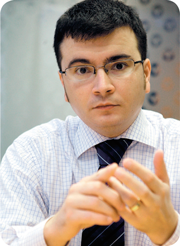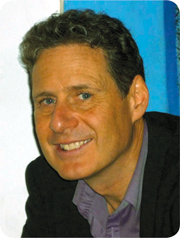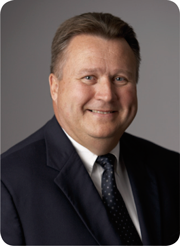
International Network
Friday, April 1, 2011
By Sue Wilson
The Carlson School’s network of global contacts and educational programs is making a powerful impact on students and companies alike.
How does a multinational corporation carry out its mission on the local level? What are the best ways to market a popular American food product in Russia? How do you manage local government relationships to gain approval for a new production facility? What green initiatives generate results and savings for a manufacturer’s worldwide supply chain
These sorts of questions exemplify the complex issues facing today’s global business community. To prepare students for such challenges, the Carlson School is designing new curricula, programs, and partnerships that build global understanding and competence, including the requirement that all undergraduate and MBA students complete an international experience as part of their degree programs.
“We want every Carlson School student to graduate with a global lens developed from hands-on experiences in business climates around the world,” says Michael Houston, associate dean of International Programs. “In the classroom, students deepen their understanding of international business issues and develop global competencies. Partnerships with leading universities, companies, and business people provide real-time international connections.”
These relationships are mutually beneficial opportunities. Businesses work with high-caliber Carlson School students and faculty on current problems, while students experience new countries, markets, and industries; see first-hand how multinational corporations operate; and put classroom theories into practice.
Vladimir Vano
A global education close to home
An international emphasis was a key reason why Vladimir Vano decided to attend the Carlson School’s Global Executive MBA program (VEMBA) at the Vienna University of Economics and Business in Vienna. Vano, chief analyst at VOLKSBANK Slovensko in Bratislava, Slovakia, was impressed that the joint program had four accreditations (AMBA, EQUIS, AACSB, and FIBAA) and allowed him to attend a U.S. university program close to his home.
Vano, who will graduate in May, says the program is delivering a strong global educational experience. His classmates represent 11 nationalities, and his professors teach in the United States, India, China, and Russia. Vano and his classmates traveled to China and India earlier this year to study at Lingnan MBA Centre at the Sun Yat-Sen University in Guangzhou and the Indian School of Business in Hyderabad. “The scheduled company site visits and the chance to meet and discuss the opportunities and challenges of globalization with local business leaders were highlights,” he says.
Vano is now turning his attention to the global team project, a hallmark of Carlson’s Global Executive MBA programs. His team is putting together a business plan for an existing company’s entry into the Asian market. “Working on the same project with team members scattered literally around the globe is a very interesting, enjoyable experience,” he says. “Finding a common time and language is not as challenging as carefully tuning in to cultural differences in communication, such as ways of expressing discontent or constructive criticism.”
Vano’s communication skills should be an asset to his team. An independent ranking by the nonprofit INEKO Institute lists him as the most frequently quoted Slovakian analyst in his category for 2008, 2009, and 2010. He also is one of more than a dozen MBA students from business schools around the globe who are writing about their experiences for the Financial Times Business Education MBA blog.
Iain Coles
A unique and rewarding stop for a global entrepreneur
Iain Coles has made the world his marketplace. As the owner and top executive of multiple businesses that provide software solutions and consulting, he has traveled nearly 253,000 miles to 36 locations around the globe in his career. That international journey also has included graduating from the VEMBA in Vienna in May 2010.
For more than a decade, Coles’ businesses grew in size and complexity while he established offices and added clients on multiple continents. To continue that growth and take his enterprises to the next level, he decided to pursue an MBA degree to strengthen his knowledge of corporate management, accounting, corporate finance, and company valuation. Like Vano, he was interested in the VEMBA program’s international residencies and welcomed the opportunity to travel to India and China.
He also valued working with and learning from his business peers. “The debate and conversation was always lively in class,” he says. “Many of my classmates are still good friends and business contacts nearly a year later.”
The global team project was another highlight for Coles. “Working across cultures and time zones in order to meet strict time and quality deadlines was a wonderful experience, as well as a strong personal challenge,” he says. “Our project—an online luxury products store aimed at China—will go live toward the end of 2011.”
Coles says that the VEMBA program has filled out his general business knowledge and awareness. “This experience is allowing me to improve the structure and functioning of my businesses and has helped me more effectively prepare one or two of them for sale,” he notes, adding that he continues to develop and add employees to his businesses.
Seminar in the future
Live case project in China propels Carlson's partnership with Mosaic
When you want to strengthen how you distribute and sell your products, it’s critical to talk with the people who distribute and buy them. That’s why the Carlson School students participating in a recent live case project with the Mosaic Company interviewed local farmers and hosted roundtable discussions with distributors during their visit to China. Mosaic is a Plymouth, Minn.-based producer of concentrated phosphate and potash crop nutrients, as well as products for crop nutrition, livestock feed, and industrial uses. With annual net sales exceeding $9.8 billion, the company has distribution facilities in 10 countries, serves customers in more than 30 countries, and employs more than 7,400 employees worldwide.
Mike Rahm, strategic and business analysis team leader, and Rick McLellan, senior vice president, commercial, both facilitated the live case project for Mosaic. The project goal was to review Mosaic’s strategy for boosting sales of its premium phosphate and potash products in developing Chinese markets. To launch the project, Rahm and McLellan discussed the Chinese fertilizer market, Mosaic’s current market position, and local regulations with students in Minneapolis. While in China, Mosaic’s local management team oversaw site tours and interviews with local farmers and distributors for the students from the Carlson School and Cheung Kong’s Graduate School of Management. The students presented their feedback and insights to local team members and then to managers in Minnesota.
McLellan says the students generated significant ideas for improving Mosaic’s market position and strategy. “They brought a clean set of critical eyes to our approach in China,” he explains. “We have already implemented some of those concepts with positive results, including the creation of a toolkit with sales training modules for our China team members. Working with the students also benefited our team in China. The interaction between the groups provided them with a valuable cross-cultural learning experience that cannot be duplicated in any other setting.
“We will look for other projects where we can work jointly,” he adds. “All of us were impressed by the quality of work.”


